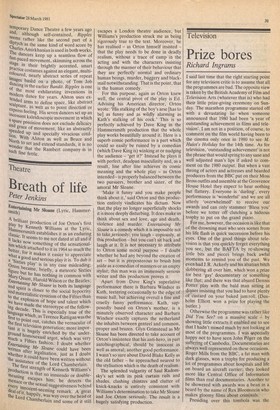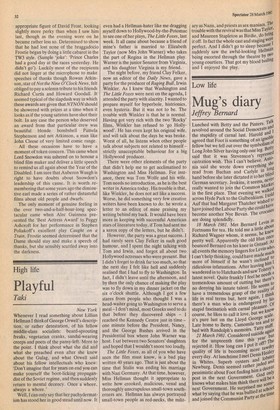Television
Prize bores
Richard In grams
I said last time that the right starting point for any television critic is to assume that all the programmes are bad. The opposite view is taken by the British Academy of Film and Television Arts (whatever that is) who had their little prize-giving ceremony on Sunday. The marathon programme started off with a devastating lie when someone announced that 1980 had been 'a year of outstanding achievement in films and television. I am not in a position, of course, to comment on the film world having been to the cinema only once in 1980 to see M. Hulot's Holiday for the 14th time. As for television, 'outstanding achievement' is not the phrase that would spring to any sane and well adjusted man's lips if asked to comment on the 1980 output, But when a vast throng of actors and actresses and bearded producers from the BBC put on their Moss Bross outfits and assemble at the Grosvenor House Hotel they expect to hear nothing but flattery. Everyone is 'darling', every performance is 'wonderful' and we are all utterly 'overwhelmed' to receive our awards and can only stammer 'Bless you' before we totter off clutching a hideous trophy to put on the grand piano.
For me, however, the occasion is like that of the drowning man who sees scenes from his life flash in quick succession before his eyes. One of the good things about television is that you quickly forget everything you see, but the BAFTA by re-showing little bits and pieces brings back awful moments to remind you of the past. We even had J.R. Ackerly and his alsatian bitch slobbering all over him, which won a prize for best 'gay' documentary or something like that; and there was that absurd Dennis Potter play with the bald man sitting at dinner insisting that you had to have plenty of custard on your baked jam roll. (Denholm Elliott won a prize for playing the butler.) Otherwise the programme was rather like Did You See? on a massive scale = by showing little extracts it enabled me to see that I hadn't missed much by not looking at most of the programmes. I was especially happy not to have seen John Pilger on the suffering of Cambodia, Documentaries are always well represented on these occasions. Roger Mills from the BBC, a fat man with dark glasses, won a trophy for producing a lot of programmes about hospitals and life on board an aircraft carrier; they looked more like Central Office of Information films than real documentaries. Another to be showered with awards was a bean in a beard by the name of Rex Bloomstein who makes gloomy films about criminals. Presiding over this tombola was the appropriate figure of David Frost, looking slightly more perky than when I saw him last, though as the evening wore on he became rather less so. Determined to show that he had lost none of the braggadocio Frostie began by doing a little cabaret in the TW3 style. (Sample `joke': 'Prince Charles had a good day at the races yesterday. He didn't go'). Luckily most of the recipients did not linger at the microphone to make speeches of thanks though Rowan Atkinson, star of Not the Nine O'Clock News, felt obliged to pay a solemn tribute to his friends Richard Curtis and Howard Goodall. It seemed typical of the slapdash way in which these awards are given that NTNON should be showered with prizes at a time when it looks as if the young satirists have shot their bolt. In any case the person who deserved an award from that particular crew was beautiful blonde bombshell Pamela Stephenson and nOt Atkinson, a man like John Cleese of very limited comic range.
All these occasions have to have a moment of token concern. This came when Lord Snowdon was ushered on to honour a blind film maker and deliver a little speech to remind us all again about the Year of the Disabled. I am sure that Auberon Waugh is right to have doubts about Snowdon's leadership of this cause. It is worth remembering that some years ago the diminutive earl made a series of rather distasteful films about old people and dwarfs.
The only moment of genuine feeling in the over two-and-a-half-hour-long spectacular came when Alec Guinness preisented the `Best Actress Award' to Peggy Ashcroft for her performance in Stephen Poliakoff's excellent play Caught on a Train. Frostie seemed determined that the Dame should stay and make a speech of thanks, but she sensibly scuttled away into the darkness.











































 Previous page
Previous page